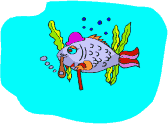 |
Fishing Stories from Ned Kehde |
|
Fishing Reports Reader's Nook Angler's Academy Club Corner Tournament Trail Success Stories Kansas Angler Info Angler Links |
Submitted by Ned Kehde - Nov. 9, 2000 David Schmitdlein, a superb crappie angler from Topeka, says he can't make up his mind whether October or March is the worst month to be a crappie fisherman. During both months, anglers are buffeted by hard winds and harsh cold fronts, which turn the crappie circumspect and unwilling to feed. Temperatures have been known to fall by more than 30 degrees in a span of six hours with a 20-mph wind from the south switching to the north and gusting to 30 mph. The walleye, like the crappie, are affected by these weather conditions, making them sullen and persnickety. What's more, both species tend to roam a lot in October, spreading far and wide across a lake and even inhabiting shallow lairs for a spell, which makes it difficult for anglers to pinpoint the whereabouts of these fish. In fact, fishing for walleye can be so confounding that very few Kansas anglers pursue them after the autumn equinox. However, the bass fisherman hereabouts ordinarily find October to be the best of times. According to Kevin Davis, one of Lawrence's most ardent and talented bass fishermen, largemouth bass aren't as adversely affected by early autumn cold fronts. Some cold fronts even provoke the bass to feed rapaciously. Yet the winds that surround these cold fronts can be irksome. There are spells when it can howl 20 mph for nearly a week To escape the wind, Davis plies such feeder creeks as the Wakarusa River on the upper reachers of Clinton Lake or North Sugar Creek at La Cygne Lake. Even during the harshest gales, these creeks are serene. What's more, bass and their favorite victuals -- gizzard shad -- tend to congregate at certain locales along these feeder creeks during the fall. A measure of Davis' prowess can be seen by the fact that he regularly catches 20 largemouth bass or more on an October outing at Clinton, which is a sorry bass abode. To accomplish such a feat, he employs three casting rods, sporting a white-skirted spinnerbait with gold blades, a customized Strike King crankbait and a white jig-and-pork combination. However, many of the streams that feed the reservoirs in northeastern Kansas are filled with silt and too shallow to accommodate many bass. Such is the case at Melvern and Milford lakes. Therefore, bass anglers at Melvern and Milford have learned how to handle the wind. And these fishermen have discovered that a windy October day is often more fruitful than a windless one. Once the water temperature approaches 60 degrees, the gizzard shad at Milford and Melvern move to the rocky shorelines and towards the backs of the large coves. Likewise, many of the bass follow suit, and the shorelines that are slapped by ranks of waves entertain the most bass. For instance, Terry Bivins of Lebo caught and released an array of bass on a chrome-and-bone Rat-L-Trap along wind-blown rocky banks and coves at Melvern. Two of Bivins' smallmouth bass weighed four pounds, 15-ounces. In addition, he regularly caught four big walleye and sauger on each outing at the same spots he caught the bass. Now Bivins is counting the days until October rolls around again. |
|
Kansas Angler Online Sponsor  |
Copyright 2000 by The Kansas Angler - P.O. Box 12261 - Wichita, KS 67211 - Phone 316-265-5551 Questions or problems with this website should be directed the link above. This Page Last Updated on date shown at top of page. |

